The richest 10% of households in Britain have seen the value of their assets increase by up to £322,000 as a result of the Bank of England's attempts to use electronic money creation to lift the economy out of its deepest post-war slump.
Threadneedle Street said that wealthy families had been the biggest beneficiaries of its £375bn quantitative-easing (QE) programme, under which it has been buying government gilts for cash since early 2009.
The Bank of England calculated that the value of shares and bonds had risen by 26% – or £600bn – as a result of the policy, equivalent to £10,000 for each household in the UK. It added, however, that 40% of the gains went to the richest 5% of households.
Although the Bank said it could not come up with precise figures for the gains from QE, estimates can be produced using wealth distribution data from the Office for National Statistics. These show the average boost to the holdings of financial assets and pensions of the richest 10% of households would have been either £128,000 per household or £322,000 depending on the methodology used.
However, Threadneedle Street said that QE had helped all sections of the population by sparing the country from a deeper slump. The rise in asset prices after QE was announced in early 2009 followed sharp falls in the two previous years.
"Without the Bank's asset purchases, most people in the UK would have been worse off," it said in a paper prepared in response to queries from the Commons Treasury committee.
The Bank's strategy has been criticised by groups representing savers and pensioners because of its impact on interest rates, annuity rates and gilt yields, which have all fallen since QE began, but Threadneedle Street was unrepentant.
"Economic growth would have been lower. Unemployment would have been higher. Many more firms would have gone out of business. This would have had a significant detrimental impact on savers and pensioners along with every other group in our society. All assessments of asset purchases must be seen in that light."
The Bank paper admitted that the benefits of ultra-low borrowing costs and asset purchases had not been shared equally.
"Some individuals are likely to have been adversely affected by the direct effects of QE. Many households have received lower interest income on their deposits.
"But changes in bank rate – not asset purchases – have been the dominant influence on the interest households receive on bank deposits and pay on bank loans.
"By pushing up a range of asset prices [such as equities and bonds], asset purchases have boosted the value of households' financial wealth held outside pension funds, although holdings are heavily skewed with the top 5% of households holding 40% of these assets."
After announcing an initial £200bn tranche of asset purchases when the economy was deep in recession in early 2009, the Bank has since expanded QE on a further three occasions and by later this year it will have bought £375bn of gilts – one third of all UK government bonds.
"The past few years have been extremely difficult for many households, with weak growth and above-target inflation being the painful but unavoidable consequences of the severe financial crisis and the associated deep recession, as well as a sharp rise in oil and other commodity prices. In response to these difficult circumstances, monetary policy has been exceptionally expansionary for an unusually long period of time.
"That has supported nominal spending and incomes in the economy as a whole, mitigating the adverse effects of the financial crisis and subsequent recession. Without the loosening in monetary policy, it is likely that the economic downturn would have been far more severe, to the detriment of almost everyone in the economy, including savers and pensioners."
The Bank said the cut in bank rate to 0.5% – the lowest on record – had been the dominant influence on the interest households receive on bank deposits and pay on bank loans. It added that the pension income of those already receiving a pension before asset purchases began had not been affected by QE, and that the retirement incomes of people coming up to retirement in a defined benefit pension scheme were also unaffected.
However, the Bank conceded that for a defined benefit pension scheme in substantial deficit, asset prices were likely to have made the shortfall bigger. "That is because although QE raised the value of the assets and liabilities by a similar proportion, that nonetheless implies a widening in the gap between the two," it said.
Ros Altmann, director general of Saga, said: "It is asserted, but not proven, that pension savers are no worse off due to QE gilt-buying, because the value of their pension savings has gone up to offset the fall in the annuity income they will receive when converting their pension fund into a pension income. This assertion is simply not correct and the reality is very different for those recently or soon-to-be-retired.
"The fall in annuity rates since mid-2008 is over 24%. Cumulative inflation for older age groups has risen by over 20%. The FTSE is relatively unchanged and the average balanced pension fund has performed poorly, so that for people with defined contribution pensions, the impact of QE in reality has not been as the Bank of England is assuming," she said.
The paper said the main factor behind increased pension deficits and falls in annuity incomes had not been the Bank's asset purchases, but rather the fall in equity prices relative to government bond prices.
"This fall in the relative price of equities was not caused by QE. It happened in all the major economies, much of it occurred prior to the start of asset purchases and stemmed in large part from the reluctance of investors to hold risky assets, such as equities, given the deterioration in the economic outlook as a result of the financial crisis. Indeed, by boosting the economy, monetary policy actions in the United Kingdom and overseas probably dampened this effect."
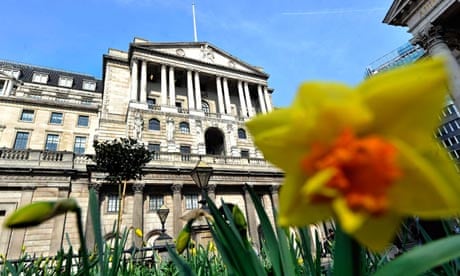
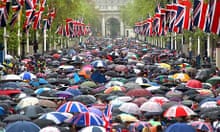
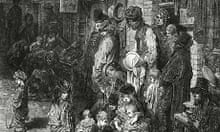



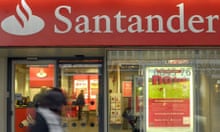
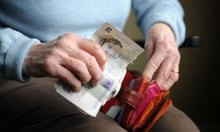


Comments (…)
Sign in or create your Guardian account to join the discussion